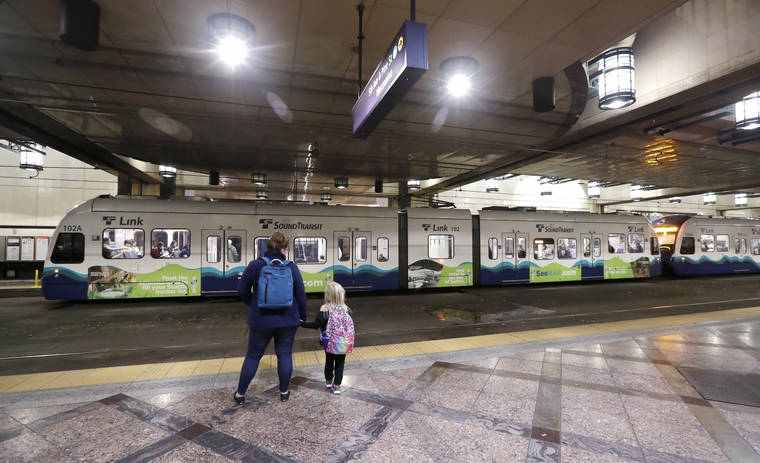SEATTLE — Washington state voters have approved a measure cutting car tabs to $30, heartily endorsing an idea that has been around for decades in a move that will cut billions of dollars from transportation budgets and leave governments scrambling for a way to pay for road paving, light rail and other projects.
Initiative 976 had a healthy lead after early returns Tuesday night and continued to pass by large margins as votes were counted Wednesday. King County, the state’s most populous county and home to Seattle, was rejecting I-976 but most other counties were approving it.
Sponsored by Tim Eyman, the measure would cap most taxes paid through annual vehicle registration at $30 and largely revoke the authority of state and local governments to add new taxes and fees without voter approval. The measure would also repeal taxes and fees that were already in place, which could cost the state and local governments more than $4 billion in revenue over the next six years, according to the state Office of Financial Management.
Eyman had said people were fed up with rising car tab costs. A large group of businesses including Microsoft and Amazon, as well as labor unions, waged a nearly $5 million opposition campaign, saying the state needs car tab dollars to maintain a safe and effective transportation system.
Over 60 cities use car-tab fees to pay for bus service, sidewalks and road construction. The state charges fees to help pay for programs including Washington State Patrol traffic enforcement, highway maintenance, ferry operations and maintenance of county roads and bridges.
Gov. Jay Inslee said in a statement Wednesday evening that he was taking immediate action in the wake of the measure’s passage, directing the state Department of Transportation to postpone projects not yet underway. He also said he asked other state agencies that receive transportation funding, including the Washington State Patrol and Department of Licensing, to defer non-essential spending as impacts are reviewed.
King County Executive Dow Constantine called the impact of I-976 to transportation “devastating” Wednesday and said he has asked the King County Prosecuting Attorney’s Office to prepare a lawsuit to challenge the measure’s constitutionality. The City of Seattle is also planning to sue.
“The passage of I-976 underscores the ongoing need for comprehensive state tax reform, but in the short term we must clean up another mess that Tim Eyman has created for our state, our region, and our economy,” Constantine said in a statement.
Anna Zivarts, program director with Rooted in Rights, which is part of Disability Rights Washington, said Wednesday she plans to organize and fight back.
“Hopefully the Legislature and local governments are going to fill the gaps as best they can and not just for drivers but for people who are really public transit dependent,” she said.
Seattle Mayor Jenny Durkan, Constantine and other government leaders were vocal in their opposition to the measure and city councils throughout the state passed resolutions against it.
Eyman also promoted the initiative as a way to undo a car-tab fee hike collected by Sound Transit in the Puget Sound region, which uses a method of vehicle valuation that inflates some car values. Voters approved the increase as part of a light-rail expansion package in 2016 for King, Snohomish and Pierce counties. Some drivers experienced car tab sticker shock after the measure was approved and costs soared. One lawsuit over the valuations is currently before the state’s high court.
With I-976’s passage, Sound Transit stands to lose about $328 million a year, or about 11% of its annual revenue, according to the state analysis. The agency said it could lose about $13 billion more over 20 years because of higher borrowing costs and possible light rail project delays.
In a statement Wednesday Sound Transit Board Chairman and Redmond Mayor John Marchione said the board would hear from its finance staff and lawyer at its Nov. 21 meeting. “The Board will consider Sound Transit’s obligations to taxpayers who want their motor vehicle excise taxes reduced, as well as how to realize voters’ earlier direction to dramatically expand high capacity transit throughout the Puget Sound region,” Marchione said.
Eyman’s $30 car tab initiative first passed 20 years ago. It was struck down in court before being enacted by lawmakers. The fees have crept up in recent years as lawmakers allowed them and voters approved them.
“I’m just elated,” Eyman said Wednesday. “Basically the voters said, ‘We haven’t changed our mind.’”
Republican Sen. Steve O’Ban of Tacoma said in a statement he has led an effort to bring car-tab relief to the counties impacted by the Sound Transit light rail project and warned lawmakers that if they didn’t do their job, voters would take action.
“My bill would have cut the Sound Transit portion of the car-tab fees by 55 percent. I-976 will have a much larger impact since it applies statewide and cuts all car-tab fees. This could have been avoided,” O’Ban said.
Eyman’s latest measure comes as he fights a campaign finance lawsuit filed against him by Attorney General Bob Ferguson. Eyman has been held in contempt of court for refusing to cooperate with court rules while a judge has ordered a for-profit signature-gathering firm to pay over $1 million for deceiving state residents by funneling their campaign donations to Eyman for his personal use.


